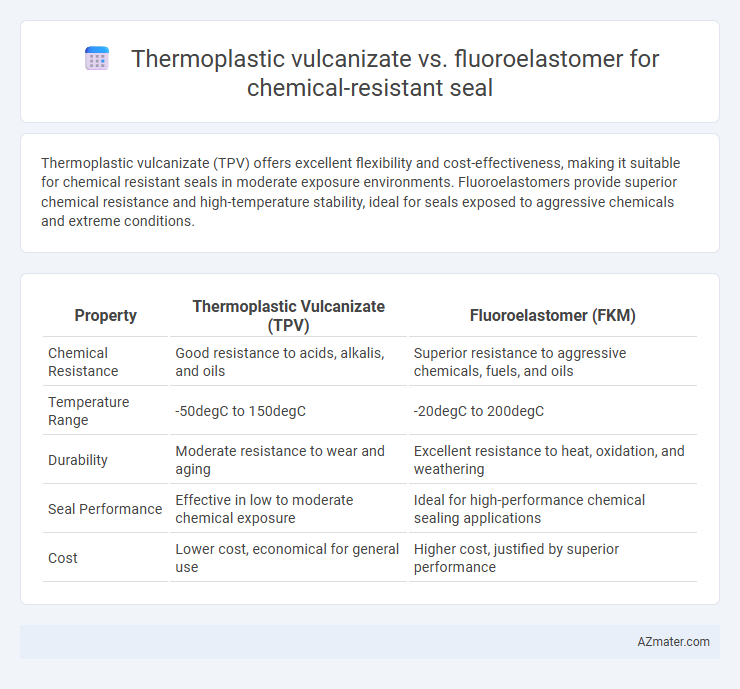Thermoplastic vulcanizate (TPV) offers excellent flexibility and cost-effectiveness, making it suitable for chemical resistant seals in moderate exposure environments. Fluoroelastomers provide superior chemical resistance and high-temperature stability, ideal for seals exposed to aggressive chemicals and extreme conditions.
Table of Comparison
| Property | Thermoplastic Vulcanizate (TPV) | Fluoroelastomer (FKM) |
|---|---|---|
| Chemical Resistance | Good resistance to acids, alkalis, and oils | Superior resistance to aggressive chemicals, fuels, and oils |
| Temperature Range | -50degC to 150degC | -20degC to 200degC |
| Durability | Moderate resistance to wear and aging | Excellent resistance to heat, oxidation, and weathering |
| Seal Performance | Effective in low to moderate chemical exposure | Ideal for high-performance chemical sealing applications |
| Cost | Lower cost, economical for general use | Higher cost, justified by superior performance |
Introduction to Chemical Resistant Seals
Thermoplastic vulcanizates (TPVs) offer excellent flexibility and moderate chemical resistance, making them suitable for seals in automotive and industrial applications exposed to common chemicals. Fluoroelastomers (FKMs) provide superior resistance to aggressive chemicals, high temperatures, and oils, ideal for seals requiring durability in harsh chemical environments such as fuel systems and chemical processing equipment. Selecting between TPV and FKM depends on the specific chemical exposure, temperature range, and mechanical demands of the sealing application.
Overview of Thermoplastic Vulcanizate (TPV)
Thermoplastic vulcanizate (TPV) is a versatile class of materials combining the elasticity of rubber with the processing advantages of thermoplastics, offering excellent chemical resistance, flexibility, and durability. TPV's unique cross-linked rubber particles dispersed in a thermoplastic matrix provide superior resistance to oils, acids, and alkalis, making it suitable for sealing applications in harsh chemical environments. Its recyclability and ease of processing further enhance its appeal over traditional fluoroelastomers in specific sealing solutions requiring cost-effective, high-performance materials.
Overview of Fluoroelastomer (FKM)
Fluoroelastomer (FKM) offers exceptional chemical resistance, particularly against fuels, oils, and aggressive solvents, making it preferred for seals in harsh environments. Its high thermal stability, typically up to 200-250degC, ensures reliable performance under elevated temperatures compared to Thermoplastic Vulcanizate (TPV). FKM seals also exhibit superior resistance to swelling, degradation, and compression set, enhancing durability in critical chemical applications.
Chemical Resistance Performance Comparison
Thermoplastic vulcanizates (TPVs) exhibit excellent resistance to acids, alkalis, and some oils, making them suitable for moderate chemical exposure applications, whereas fluoroelastomers (FKM) provide superior resistance to a wider range of aggressive chemicals including hydrocarbons, ketones, and high-temperature chemicals. FKM seals maintain their integrity and flexibility in harsh environments with temperatures typically up to 200-250degC, while TPVs degrade faster under similar conditions. The choice between TPV and FKM depends on the specific chemical compatibility and operating temperature requirements for optimal seal performance.
Mechanical Properties and Durability
Thermoplastic vulcanizates (TPVs) offer excellent flexibility and high abrasion resistance, making them suitable for dynamic sealing applications with moderate chemical exposure. Fluoroelastomers (FKM) exhibit superior mechanical strength, outstanding heat resistance up to 200-250degC, and exceptional chemical durability, especially against aggressive solvents, fuels, and acids. The enhanced durability and resistance to swelling and degradation in harsh chemical environments position fluoroelastomers as the preferred choice for long-term sealing solutions requiring superior mechanical performance.
Temperature Resistance Capabilities
Thermoplastic vulcanizates (TPVs) typically offer temperature resistance up to 135degC to 150degC, making them suitable for moderate chemical sealing applications. In contrast, fluoroelastomers (FKMs) exhibit superior high-temperature resistance, maintaining chemical seal integrity at temperatures ranging from -20degC up to 200degC or higher. This enhanced thermal stability of fluoroelastomers enables their use in aggressive environments requiring prolonged exposure to elevated temperatures and harsh chemicals.
Cost Analysis: TPV vs Fluoroelastomer
Thermoplastic vulcanizates (TPVs) offer a lower initial cost compared to fluoroelastomers, making them economically favorable for large-volume chemical-resistant seal applications. Fluoroelastomers, while more expensive upfront, provide superior chemical resistance, thermal stability, and longer service life, which can reduce replacement frequency and overall maintenance costs. In cost-sensitive projects where moderate chemical exposure occurs, TPVs deliver value, but for high-performance requirements and aggressive chemicals, the investment in fluoroelastomers can offer better long-term cost-efficiency.
Applications in Chemical Processing Industries
Thermoplastic vulcanizates (TPVs) offer excellent flexibility and chemical resistance, making them suitable for seals in less aggressive chemical processing environments such as water treatment and food processing plants. Fluoroelastomers (FKM) provide superior resistance to harsh chemicals, high temperatures, and aggressive solvents, which makes them ideal for use in seals within petrochemical refining, pharmaceutical manufacturing, and aggressive chemical handling applications. The choice between TPV and FKM depends on the specific chemical exposure, temperature range, and mechanical demands of the chemical processing industry where the seals are deployed.
Environmental and Regulatory Considerations
Thermoplastic vulcanizates (TPVs) offer excellent chemical resistance with easier recyclability and lower environmental impact compared to fluoroelastomers, which are more challenging to recycle and often involve fluorinated compounds with stricter regulatory controls. Fluoroelastomers provide superior resistance to harsh chemicals and extreme temperatures but face increasing scrutiny due to persistent environmental pollutants like PFAS and tighter regulations from agencies such as the EPA and REACH. Selecting between TPVs and fluoroelastomers requires balancing chemical performance with compliance to evolving environmental standards and sustainability goals in chemical-resistant seal applications.
Selecting the Best Material for Chemical Resistant Seals
Thermoplastic vulcanizate (TPV) offers excellent flexibility and resistance to many chemicals, making it suitable for seals exposed to mild acids, alkalis, and diluted solvents, while Fluoroelastomers (FKM) excel in harsh chemical environments due to their superior resistance to high temperatures, aggressive chemicals, and fuels. Selecting the best material for chemical resistant seals involves evaluating factors such as chemical compatibility, temperature range, mechanical properties, and cost-effectiveness to ensure optimal performance and longevity. Fluoroelastomers generally outperform TPVs in extreme conditions, but TPVs provide a cost-efficient alternative for less demanding applications.

Infographic: Thermoplastic vulcanizate vs Fluoroelastomer for Chemical resistant seal
 azmater.com
azmater.com